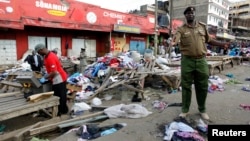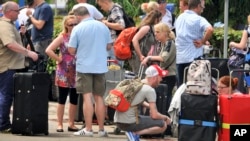MOMBASA —
Kenyan officials say at least 10 people died and 70 others were wounded Friday in two explosions targeting a minibus and a busy market in the capital city, Nairobi. The attacks came days after the U.S. and British governments issued travel advisories regarding potential terrorist attacks in the country.
Investigators said improvised explosive devises were used to target the attacks. The minibus was spattered with blood, its windows and tires blown out. A second bomb exploded nearby, also near a market best known for second-hand clothing.
“I saw the explosion. People were running in all directions,” Reuters quoted a female witness as saying. “I know some of the people who died.”
Nairobi Police Chief Benson Kibui said police, acting on tips from the public, had detained a bombing suspect. Security officials said the suspect is a Kenyan national.
In a statement Friday, the U.S. embassy in Nairobi warned its citizens to increase their personal security in light of Kenya's continuing terror threats and violent crime. “Terrorist acts can include suicide operations, bombings - to include car bombings - kidnappings, attacks on civil aviation, and attacks on maritime vessels in or near Kenyan ports,” the statement read in part.
The blasts came a day after 300 British tourists were evacuated from the coastal city of Mombasa, following a travel advisory issued by the British Foreign Office.
Kenyan President Uhuru Kenyatta said evacuations only help the terrorists.
Such action “only strengthens the will of terrorists as opposed to helping us defeat that war,” Kenyatta said.
Tourism economy suffers
The Mombasa County executive in charge of tourism, Joab Tumbo, lamented the impact of the bombings and advisories.
“As we speak right now, evacuation has taken place. We also understand that the evacuation will continue,” Tumbo said, adding that Kenya is “staring at a possibility of hotels closing down."
One immediate commercial victim of Friday's bombings was a regional telecom conference, East African Com, scheduled to take place in Nairobi next week and to attract top industry executives. Organizers said they canceled it because of security concerns.
Past attacks in the east African nation have been widely blamed on the Somali Islamist militant group al Shabaab, which wants Kenyan troops out of Somalia. In September, gunmen from the group killed 67 people in a raid on a Nairobi shopping mall.
Many of the attacks have been along Kenya's Indian Ocean coast, including the port of Mombasa, a tourist favorite. Some others have been in Nairobi, mainly near the Somali-populated Eastleigh district. Friday's blasts were close to Eastleigh.
Tourism already had been damaged by kidnappings by Somali pirates in the north near the Somali border, though that threat has subsided over the past 18 months.
Investigators said improvised explosive devises were used to target the attacks. The minibus was spattered with blood, its windows and tires blown out. A second bomb exploded nearby, also near a market best known for second-hand clothing.
“I saw the explosion. People were running in all directions,” Reuters quoted a female witness as saying. “I know some of the people who died.”
Nairobi Police Chief Benson Kibui said police, acting on tips from the public, had detained a bombing suspect. Security officials said the suspect is a Kenyan national.
In a statement Friday, the U.S. embassy in Nairobi warned its citizens to increase their personal security in light of Kenya's continuing terror threats and violent crime. “Terrorist acts can include suicide operations, bombings - to include car bombings - kidnappings, attacks on civil aviation, and attacks on maritime vessels in or near Kenyan ports,” the statement read in part.
The blasts came a day after 300 British tourists were evacuated from the coastal city of Mombasa, following a travel advisory issued by the British Foreign Office.
Kenyan President Uhuru Kenyatta said evacuations only help the terrorists.
Such action “only strengthens the will of terrorists as opposed to helping us defeat that war,” Kenyatta said.
Tourism economy suffers
The Mombasa County executive in charge of tourism, Joab Tumbo, lamented the impact of the bombings and advisories.
“As we speak right now, evacuation has taken place. We also understand that the evacuation will continue,” Tumbo said, adding that Kenya is “staring at a possibility of hotels closing down."
One immediate commercial victim of Friday's bombings was a regional telecom conference, East African Com, scheduled to take place in Nairobi next week and to attract top industry executives. Organizers said they canceled it because of security concerns.
Past attacks in the east African nation have been widely blamed on the Somali Islamist militant group al Shabaab, which wants Kenyan troops out of Somalia. In September, gunmen from the group killed 67 people in a raid on a Nairobi shopping mall.
Many of the attacks have been along Kenya's Indian Ocean coast, including the port of Mombasa, a tourist favorite. Some others have been in Nairobi, mainly near the Somali-populated Eastleigh district. Friday's blasts were close to Eastleigh.
Tourism already had been damaged by kidnappings by Somali pirates in the north near the Somali border, though that threat has subsided over the past 18 months.





